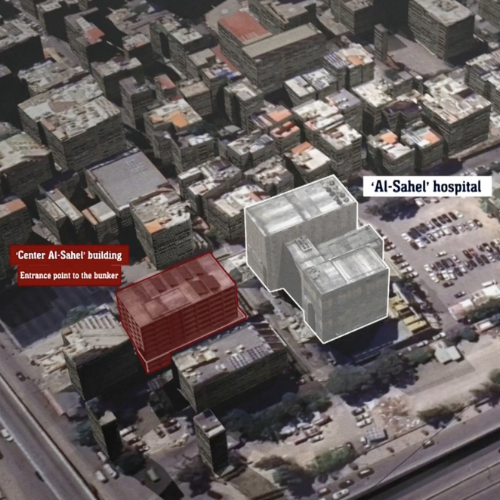Recently, a startling revelation has emerged from the ongoing conflict between Israel and Hezbollah, a powerful militant group based in Lebanon. The Israeli Defense Forces (IDF) have uncovered a hidden bunker beneath Al-Sahel Hospital in a suburb of Beirut called Dahiyeh. This bunker is said to contain an astonishing amount of cash and gold worth approximately $500 million (around Rs 4,200 crore). This shocking find has raised many questions about the activities of Hezbollah and the impact on the people of Lebanon.
The Discovery of the Bunker
The IDF has been conducting extensive military operations in Lebanon in response to the ongoing conflict. In their latest actions, they claim to have identified a bunker built by the former leader of Hezbollah, Hassan Nasrallah. This bunker is reported to be strategically located beneath the Al-Sahel Hospital, a facility that serves many people in the area. The IDF revealed that the bunker serves as Hezbollah’s main money storage facility, where funds allegedly taken from the Lebanese people are kept.
The IDF spokesperson, Rear Admiral Daniel Hagari, held a press conference to share details about this bunker. He stated that it is not just a hiding place; it is designed for long-term use. Inside, there are rooms, beds, and other amenities that allow for extended stays. Hagari emphasized that the funds stored in the bunker could have been used to help rebuild Lebanon, which has been struggling economically. Instead, he claims these resources are being used to strengthen Hezbollah.
Hagari described the situation, stating, “This bunker is deliberately placed under the hospital and on both sides of it.” He explained that the bunker is a significant part of Hezbollah’s operations, enabling them to conduct their activities while hiding within civilian infrastructure. This strategy has become a common practice for groups like Hezbollah, similar to accusations made against Hamas in Gaza.
The IDF also shared photos and a video simulation of the bunker, showing its layout and how it connects to the hospital above. They have not yet targeted this particular site with airstrikes but indicated that they are closely monitoring it.
The Response from Hospital Officials
Following the IDF’s allegations, officials from Al-Sahel Hospital have strongly denied any wrongdoing. Fadi Alameh, the head of the hospital, described the IDF’s claims as false and slanderous. He stated that the hospital operates with only essential facilities, including operating rooms and a morgue, and there is no hidden bunker or illegal activities occurring beneath it.
Alameh called upon the Lebanese Army and other international observers to investigate the claims and verify the hospital’s operations. He expressed concern for the safety of the hospital staff and patients amid the ongoing conflict. Many staff members have been evacuated due to fears of airstrikes, even though the IDF had previously stated that they would not target the hospital.
Israeli Airstrikes in Beirut Target Hezbollah’s Financial Backbone Al-Qard al-Hassan
This denial from hospital officials adds another layer of complexity to the situation. It raises questions about the reliability of the information being presented by the IDF and the potential impact of the ongoing conflict on innocent civilians.
Understanding Hezbollah’s Financing
The discovery of such a vast amount of money and gold has shed light on how Hezbollah is funded. The IDF claims that Iran plays a significant role in financing Hezbollah. They allege that money is transferred from Iranian oil sales in Syria to Hezbollah through Iran’s Quds Force. Furthermore, it is believed that Iran sends suitcases filled with cash and gold directly to the Iranian Embassy in Beirut, which then distributes the funds to Hezbollah.
In addition to these direct financial transfers, Hezbollah reportedly uses a quasi-banking system known as al-Qard al-Hassan. This institution has more than 30 branches across Lebanon and serves as a lifeline for many people, especially following the country’s financial crisis in 2019. However, the U.S. government has imposed sanctions on al-Qard al-Hassan since 2007, labeling it as a cover used by Hezbollah to manage its financial activities.
The IDF’s recent statements have highlighted that the money stored in the bunker could have been used to support the reconstruction and recovery of Lebanon, a country facing economic hardships. Instead, they argue that this wealth is being utilized to bolster Hezbollah’s military capabilities. The accusations against Hezbollah have raised alarm bells not only in Lebanon but also internationally, as the situation continues to unfold amidst the backdrop of ongoing conflict.
The revelations about the bunker and its contents have sparked debates about the accountability of militant groups like Hezbollah and their use of resources that could otherwise benefit the wider population. With the economic situation in Lebanon already dire, the question remains as to how such hidden wealth impacts the everyday lives of its citizens, who are struggling with the consequences of political instability and war.
The discovery of this bunker and the claims surrounding it serve as a reminder of the complexities of war, where militant groups operate in civilian areas, complicating efforts to address humanitarian needs. The ongoing conflict has profound implications not just for Hezbollah and Israel, but for the millions of innocent people caught in the middle of this struggle.


